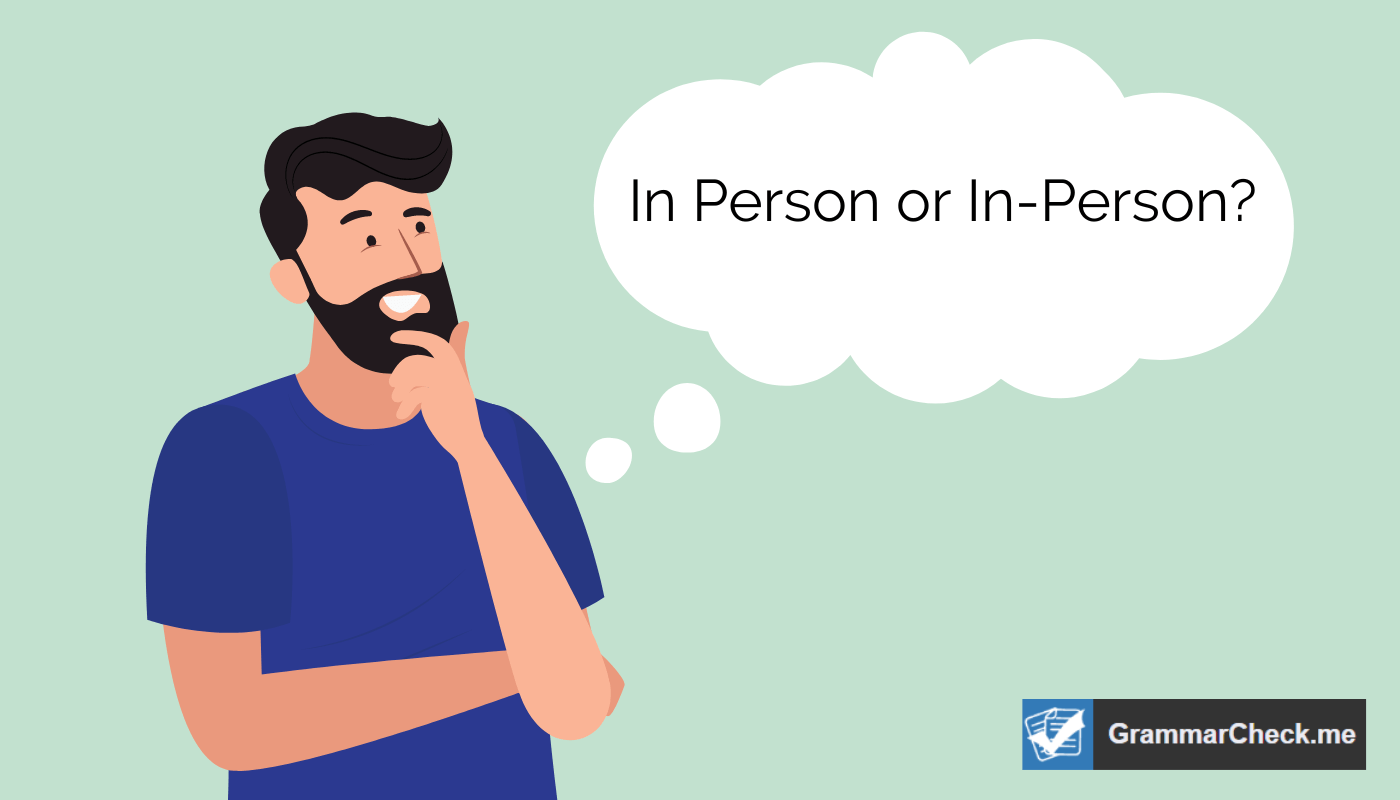Is “in person” one word or two? This is a question that often trips up new writers. Some say that it should be hyphenated because it is an adjective, while others believe that it should be two words because it is an adverb. Luck for you, this article is going to answer the burning question: Is “in person” hyphenated? Read on to get your answer and some additional hyphenation grammar rules.
Always using the right words? Make sure:
Check Your TextShould I Use “In Person” or “In-Person”?

Like most of the English grammar rules, it depends on the context of the sentence.
If you are using the prepositional phrase as an adverb you do not need a hyphen (in person). If you are using it as an adjective prepositional phrase you do need the hyphen (in-person).
Here are some examples to make things clear:
Adjective: Due to COVID, my company will not allow an in-person interview. We will have to host our personal meeting over Zoom.
Adverb: Due to COVID-19, we can no longer conduct the interview in person.
Adjective: I hate in-person visits because I just know I will be stuck in traffic. I’d rather meet over Skype.
Adverb: I am not great at talking in person. I have much more confidence in making presentations over Zoom or Skype.
Although both the adverb and adjective refer to someone else’s physical presence usually face to face, the adjective modifies nouns. This is very similar to what we found in our post about the phrase “year and a half” and its hyphenation rules!
Takeaway: If it is used as an adverbial prepositional phrase use two separate words. If it is used as an adjective prepositional phrase use a single hyphenated word.
Comparison: Adverbs vs Adjectives
Now that you know when & when not to use hyphens. But in order to avoid making silly grammatical mistakes with hyphens, you need to understand adverbs and adjectives.
- Adjectives are used to describe, identify and quantify people or things and usually go in front of a noun, just like unorganized or even disorganized. They don’t change if the noun is plural.
- Adverbs, on the other hand, modify verbs, adjectives and other adverbs and usually come after the verb. For example, in the sentence “He swims quickly,” the adverb “quickly” modifies the verb “swims.” Adverbs can be very effective for adding detail and emphasis.
And for those of you wondering, yes adjectives can even be made into adverbs by adding -ly or other tricks!
Memory Trick
If you’re having trouble memorizing this hyphenation rule, I suggest using software like ProWritingAid or even Grammarly software to make it easy. However, if you just need a simple trick we have you covered.
Remember the following phrase: Use on single word when describing a noun!
“I am so excited for my in-person event next week!”
Once you memorize this simple trick it will become much easier. You will start to notice a pattern in English phrases like “up to or up-to” that you would not have seen in the past.
FAQs – Hyphenated Words
To use in-person in a sentence you could say, “I had an in-person meeting with my boss today.”
Yes, in person training is hyphenated when used as an adjective. It means “done in person, as opposed to online or by phone.” For example, “I’m looking for an in-person trainer who can help me get fit.” However, if “in person” is used as an adverbial phrase, there is no hyphen.
In most situations “in class” is not hyphenated. However, when used as a compound adjective, such as “in-class discussion,” it is grammatically correct to hyphenate “in class”.
You can say words like:
– Candidly
– Plainly
– Point-Blank
We hyphenate words because it helps to glue or combine words together. When two or more words are combined together, a hyphen is used to show where they break and join. In some cases, the hyphenated word can have a different meaning from the individual words it is made up of.
The Bottom Line
So, when do you hyphenate “in person”? It depends on how you’re using the phrase. If it’s an adjective, then you need to hyphenate it. But if it’s an adverb, then you shouldn’t hyphenate it because that’s how adverbs are formed. Hopefully, this article has cleared up any confusion about when to use “in-person” and when not to. Use these grammar tips to become a better writer today!
